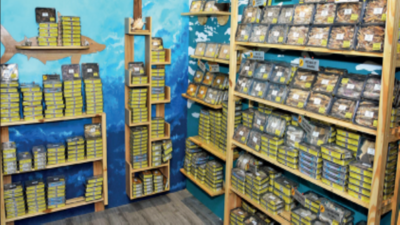Top Searches
- News
- City News
- chennai News
- These techies quit their jobs to sell dry fish without raising a stink
These techies quit their jobs to sell dry fish without raising a stink

Packed dry fish on display at Lemurian Bazaar stall at Madurai Railway Junction
Two schoolmates – R Kalaikathiravan and A Krishnasamy went on to complete their engineering graduation from different colleges in 2009 but ended up being roommates in Chennai, where they got their first jobs. Their jobs took them to Cuddalore and Bengaluru later, but they still shared one dream: to return to their hometown Ramanathapuram and establish a business of their own.
However, unlike other engineering graduates who aspire to launch a business in technology or engineering space, these two opted to sell ‘dry fish’. It was not an overnight decision. They had been discussing this venture over phone even while working for a wastewater management company at Cuddalore and a firewall company in Bengaluru. They named their venture ‘Lemurian Bazaar’.
In 2019, Kalaikathiravan resigned his job in Cuddalore and returned to Ramanathapuram.
Krishnasamy joined him two years later. It was a calculated risk, learning the nuances of the dry fish trade and finding quality product. “My family was terrified that I may not get a bride when they learned I was quitting my IT job to sell dry fish. Hence, I waited six months after marriage, convinced my spouse and family before taking the jump,” says Krishnasamy, who kept shuttling between Bengaluru and Ramanathapuram during weekends to help his friend establish the business.
Finding quality dry fish and packaging it without the smell emanating from the boxes were the next big challenges. They wanted to sell dry fish online. Fishermen here process only the unsold catch as dry fish, unlike in Sri Lanka, where the best catch is dried. “We visited many places to buy dry fishand sometimes discarded loads because of poor quality. Finally, we found a fisherman-cum-trader Mookan from Pamban who agreed to supply the quality we expected,” says Kalaikathiravan.
They also identified Puthumaipen, a 10-member women selfhelp group in Mandapam, to packthe dry fish in airtight containers. These also had QR codes, scanning which connects a user to YouTube channels for cooking recipes for that particular variety, besides providing access to the lab certificate and business page of Lemurian Bazaar. They launched their product on Amazon and the response was encouraging with sales of 3 lakh a month.
Around the same time, Madurai Railway Division identified dry fish as the ‘one station, one product’ (OSOP) for Ramanathapuram. Lemurian Bazaar got the OSOP opportunity. “We used to sit with our boxes on a table and many passengers assumed we were selling sweets. But the product and packaging were a great success,” says Krishnasamy.
Realizing that a big city will fetch more sales, they decided to approach Railway officials for space at Madurai Junction. The divisionhas given them space for one year. While the initial challenge of selling dry fish was the smell, the beautifully designed ‘dry fish hut’ with a sea and coast background now sits next to a flower shop in Madurai junction. While Kalaikathiravan takes care of Madurai.
Lemurian Bazaar’s Dry Fish Hut sells 30 varieties of dry fish with prices ranging from 100 to 400. Starting from nethili (anchovies) to sharks and stingrays, the shop has many varieties for the customers to pick from. Anchovies are sold as salted and unsalted. Finding unsalted dry fish is a rare treat for customers. The promoters hope to clock a turnover of 15 lakhs a month and a turnover of 2 crore in the first year.
Besides some personal investment, the promoters have raised around 25 lakh from NABARD and aim to establish additional outlets once sales stabilize.
However, unlike other engineering graduates who aspire to launch a business in technology or engineering space, these two opted to sell ‘dry fish’. It was not an overnight decision. They had been discussing this venture over phone even while working for a wastewater management company at Cuddalore and a firewall company in Bengaluru. They named their venture ‘Lemurian Bazaar’.
In 2019, Kalaikathiravan resigned his job in Cuddalore and returned to Ramanathapuram.
Krishnasamy joined him two years later. It was a calculated risk, learning the nuances of the dry fish trade and finding quality product. “My family was terrified that I may not get a bride when they learned I was quitting my IT job to sell dry fish. Hence, I waited six months after marriage, convinced my spouse and family before taking the jump,” says Krishnasamy, who kept shuttling between Bengaluru and Ramanathapuram during weekends to help his friend establish the business.
Finding quality dry fish and packaging it without the smell emanating from the boxes were the next big challenges. They wanted to sell dry fish online. Fishermen here process only the unsold catch as dry fish, unlike in Sri Lanka, where the best catch is dried. “We visited many places to buy dry fishand sometimes discarded loads because of poor quality. Finally, we found a fisherman-cum-trader Mookan from Pamban who agreed to supply the quality we expected,” says Kalaikathiravan.
They also identified Puthumaipen, a 10-member women selfhelp group in Mandapam, to packthe dry fish in airtight containers. These also had QR codes, scanning which connects a user to YouTube channels for cooking recipes for that particular variety, besides providing access to the lab certificate and business page of Lemurian Bazaar. They launched their product on Amazon and the response was encouraging with sales of 3 lakh a month.
Around the same time, Madurai Railway Division identified dry fish as the ‘one station, one product’ (OSOP) for Ramanathapuram. Lemurian Bazaar got the OSOP opportunity. “We used to sit with our boxes on a table and many passengers assumed we were selling sweets. But the product and packaging were a great success,” says Krishnasamy.
Realizing that a big city will fetch more sales, they decided to approach Railway officials for space at Madurai Junction. The divisionhas given them space for one year. While the initial challenge of selling dry fish was the smell, the beautifully designed ‘dry fish hut’ with a sea and coast background now sits next to a flower shop in Madurai junction. While Kalaikathiravan takes care of Madurai.
Lemurian Bazaar’s Dry Fish Hut sells 30 varieties of dry fish with prices ranging from 100 to 400. Starting from nethili (anchovies) to sharks and stingrays, the shop has many varieties for the customers to pick from. Anchovies are sold as salted and unsalted. Finding unsalted dry fish is a rare treat for customers. The promoters hope to clock a turnover of 15 lakhs a month and a turnover of 2 crore in the first year.
Besides some personal investment, the promoters have raised around 25 lakh from NABARD and aim to establish additional outlets once sales stabilize.
Start a Conversation
FOLLOW US ON SOCIAL MEDIA
FacebookTwitterInstagramKOO APPYOUTUBE









